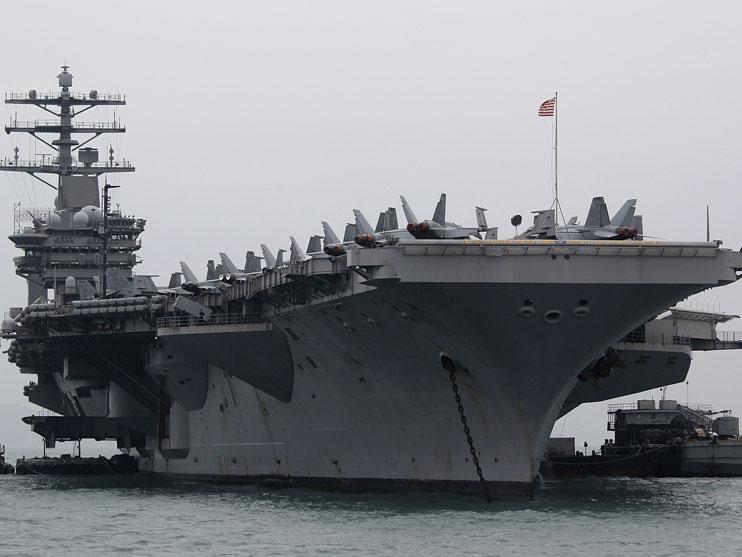by Tom Gjelten, NPR February 19, 2010
![]()
China's recent disputes with the United States ¡X over climate change, Iran, cyberattacks, currency values, Taiwan and the Dalai Lama ¡X involve just about every agency of the U.S. administration. ¡@
But just one, the Pentagon, has been singled out for punishment. ¡@

Despite U.S.-China tensions, Chinese officials permitted the USS Nimitz to make an official port call in Hong Kong.
It's a familiar pattern.
When relations have been good between the U.S. and China, the military relationship has been the last to come along," notes David Finkelstein, a China expert at the Center for Naval Analyses. "When relations have been bad, it's been the first to be thrown overboard. ¡@
In the latest example, the Chinese government announced it was suspending contacts between the U.S. and Chinese militaries to protest the Obama administration's announcement last month of new arms sales to Taiwan, which China regards as a province. ¡@
Weak Military Ties
U.S.-China military ties are relatively weak to begin with, so they are especially vulnerable when tensions flare in the relationship between the two countries.
Chinese business leaders, scientists and diplomats regularly engage with their U.S. counterparts. But China's Peoples Liberation Army, in the words of a senior U.S. official, "is a rather insular organization," less attuned to the niceties of international relations.
After the announcement of the Taiwan arms sale, for example, two senior PLA generals suggested that their government retaliate by selling some of the U.S. government bonds held by China's central bank. China currently holds about $800 billion in U.S. Treasury securities.
Dumping them on the bonds market would have damaged the U.S. economy. But it would have meant a huge financial loss to China as well ¡X a fact that may not have occurred to the Chinese military leaders.
"They've got plenty of information," says Finkelstein, a retired Army officer and former top China analyst at the Defense Intelligence Agency. "The question is, do they understand what they're reading? Do they understand what they're seeing? That's a whole different question. Who's interpreting the world for the PLA leadership? What kind of spin are they putting on it?
Military Exchanges
It's because of this insularity that U.S. officials believe it is important for Chinese military officers to have regular exchanges with their U.S. counterparts.
Such routine contacts "make it harder for the PLA or those in China to demonize the United States," says Philip Saunders, a faculty member and research fellow at the U.S. military's National Defense University. Saunders has observed military exchanges involving Chinese military officers and noticed how they resulted in changed Chinese attitudes toward the United States.
"It's often very different than they imagined," Saunders says. "The discussions that you see in these meetings are substantive, and it makes it harder for them to have a straw man caricature of the United States as a country that is opposed to them and a military that is out to get them.
Chinese leaders apparently recognize the value of regular military-to-military ties as well. Even while suspending most contacts to protest the Taiwan arms sale, they stopped short of a total cutoff.
Just this week, for example, the USS Nimitz, an aircraft carrier with a four-ship escort, was permitted to make an official port call in Hong Kong. U.S. officials had feared that China's announcement meant the port visit would have to be canceled.
"This visit was requested through normal channels via the Chinese Ministry of Foreign Affairs, and we're delighted that we did receive permission," says Cmdr. Jeff Davis, a spokesman for the U.S. Navy's 7th Fleet. "We're certainly mindful of some bigger things going on right now in the U.S.-China relationship, [but] for us, it's a routine visit.
A Challenging Relationship
Still, more tensions are inevitable. China is a rising power, and the list of its conflicts with the United States is growing steadily. Near the top is Taiwan. The prospect of an armed showdown over the island has been anticipated for many years. Military-to-military contacts might lessen the danger of such a confrontation, but they can not eliminate it.
"The purpose of a military makes this a difficult story," Finkelstein says. "This is not the State Department. It's the job of military people everywhere, whether in Beijing or Washington, to think about the worst possible contingencies, and be prepared to deal with them.
"To the degree that that type of thinking can overcome an institution, yes, there are people on both sides of the Pacific who look at each other as adversaries," he says.
U.S. officials who follow China believe that Beijing recognizes that the fates of the United States and China are intertwined, and that it's not in either side's interest to ratchet up the tensions.
But U.S. and Chinese interests do diverge in some areas, and managing this
relationship ¡X on both the military and nonmilitary fronts ¡X will be a challenge
for years to come.